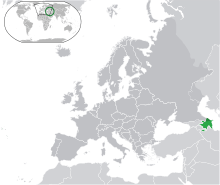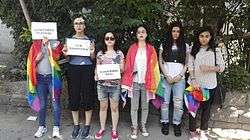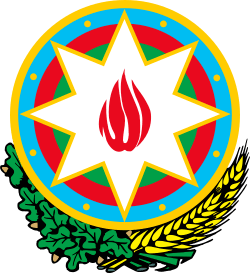LGBT rights in Azerbaijan
| LGBT rights in Azerbaijan | |
|---|---|
 Location of LGBT rights in Azerbaijan (green) in Europe (dark grey) – [Legend] | |
| Same-sex sexual intercourse legal status | Legal since 2000[1] |
| Gender identity/expression | – |
| Military service | No |
| Discrimination protections | No |
| Family rights | |
| Recognition of relationships | No recognition of same-sex relationships |
| Adoption | No |
Lesbian, gay, bisexual and transgender (LGBT) people in Azerbaijan may face legal challenges not experienced by non-LGBT residents. Same-sex sexual activity has been legal in Azerbaijan since 1 September 2000.[2] Nonetheless, discrimination on the basis of both sexual orientation and gender identity is not banned in the country and same-sex marriage is outlawed.
In 2016, the ILGA ranked Azerbaijan as the worst place (49 out of 49) in Europe to be LGBT, citing "a near total absence of legal protection" for LGBT individuals.[3] In 2017, ILGA-Europe again declared Azerbaijan the worst country in all of Europe for LGBT rights, with the country receiving a final score of 5%.[4] In September 2017, reports emerged that at least 100 members of Baku's LGBT community were arrested, ostensibly as part of a crackdown on prostitution. Activists reported that these detainees were subject to beatings, interrogation, forced medical examinations and blackmail.[5][6]
LGBT people face high rates of violence, harassment and discrimination.[7]
History
After declaring independence from Russia in 1918, the Azerbaijan Democratic Republic did not have laws against homosexuality. When Azerbaijan became a part of the Soviet Union in 1920, it was subject to rarely enforced Soviet laws criminalizing the practice of sex between men. Despite Vladimir Lenin having decriminalized homosexuality in Soviet Russia, sexual intercourse between men (incorrectly termed pederasty in the laws, rather than the technically accurate term sodomy) became a criminal offense in 1923 in Azerbaijan SSR,[8] punishable by up to five years in prison for consenting adults, or up to eight years if it involved force or threat.[9][10]
Azerbaijan regained its independence in 1991, and in 2000 repealed the Soviet-era anti-sodomy law.[11] A special edition of Azerbaijan, the official newspaper of the National Assembly, published on 28 May 2000, reported that the National Assembly had approved a new criminal code, and that the President had signed a decree making it law beginning on 1 September 2000. Repeal of Article 121 was a requirement for Azerbaijan to join the Council of Europe,[12] and after sodomy was removed from the Azerbaijan Criminal Code in 2000, Azerbaijan became the 43rd member state of the Council on 25 January 2001.[13]
The age of consent is now equal for both heterosexual and homosexual sex, at 16 years of age.[2]
Recognition of same-sex relationships
Same-sex couples are not legally recognised. Same-sex marriage and civil unions are not allowed.[14]
Gender identity and expression
Azerbaijan possesses no legislation enabling transgender people to legally change their sex on their official documents. However, transgender people are allowed to change their name so that it matches their gender identity.[14]
Blood donation
Everyone can donate blood. No social or ethnic group are banned by law from donating.[14]
Living conditions

Azerbaijan is largely a secular country with one of the least practicing majority-Muslim populations.[15] The reason behind homophobia is mostly due to the lack of knowledge about it, as well as due to the "old traditions".[16] Families of homosexuals often cannot come to terms with the latters' sexuality, especially in rural areas. Coming out often results in violence or ostracism by the family patriarchs or forced heterosexual marriage.[17][18]
There were rumours of an LGBT parade being organized in time for the Eurovision Song Contest 2012, which was hosted by Azerbaijan. This caused disagreement in the society due to homophobic views, but it did gain support from Azerbaijani human rights activists.[19] The contests presence in Azerbaijan also caused diplomatic tensions with neighbouring Iran. Iranian clerics Ayatollah Mohammad Mojtahed Shabestari and Ayatollah Ja'far Sobhani condemned Azerbaijan for "anti-Islamic behaviour", claiming that Azerbaijan was going to host a gay parade.[20] This led to protests in front of the Iranian embassy in Baku, where protesters carried slogans mocking the Iranian leaders. Ali Hasanov, head of the public and political issues department in the Azerbaijani President's administration, said that gay parade claims were untrue, and warned Iran not to meddle in Azerbaijan's internal affairs.[21] In response, Iran recalled its ambassador from Baku,[22] while Azerbaijan demanded a formal apology from Iran for its statements in connection with Baku's hosting of the Eurovision Song Contest,[23] and later also recalled its ambassador from Tehran.[24]
Society
Like in most other post-Soviet era countries, Azerbaijan remains a place where homosexuality is an issue surrounded by confusion. There is hardly any objective or correct information on the psychological, sociological and legal aspects of homosexuality in Azerbaijan, with the result that the majority of the society simply does not know what homosexuality is.[6][16][25]
"Coming out" as a gay, lesbian, bisexual or transgender person is, therefore, rare and individual LGBT people are afraid of the consequences. Thus many lead double lives, with some feeling deeply ashamed about being gay.[18] Those who are financially independent and living in Baku, are able to lead a safe life as an LGBT person, as long as they 'practice' their homosexuality in their private sphere. There is no LGBT political movement, but there is awareness among some human rights activists and LGBT people of the need for an organization advocating LGBT rights and protection.[26]
Although homosexual acts between consenting male adults were officially decriminalized, reports about police abuses against gays, mainly male prostitutes, have persisted. While complaining of the violence against them, the victims preferred to remain anonymous fearing retaliation on the part of the police.[6]
Media
The first news website for LGBT people in Azerbaijan was launched by Ruslan Balukhin on 25 May 2011: gay.az.
The Azerbaijani Constitution guarantees freedom of expression for everyone by all forms of expressions.[27] The Azerbaijan Press Council was founded in 2003. The council deals with complaints according to the Press Code of Conduct. It is unknown if the Council has assessed complaints of harassment made by state-controlled media using homosexuality as a tool to harass and discredit critics of the Government.[14]
Azerbaijan's human rights NGOs have been successful in raising awareness of the lives of Azeri LGBT people.[28]
The first LGBT online magazine Minority Magazine founded by Samad Ismayilov in December 2015. The magazine covers educational, entertaining and current issues about LGBT people. The magazine started functioning as an NGO from August 2017.[29]
Film
An LGBT activist and the founder of Minority Magazine, Samad Ismayilov, made a documentary movie about a transgender man from Azerbaijan called Sebastian. The film focuses on Sebastian's challenges, fears and dreams about the future. It was filmed in Ohio in the United States. The film made its debut in Baku on 25 November 2017, with the support of the Dutch embassy. About 80 people came to watch the movie and participate at LGBT discussions after the film.[30]
Literature
In 2009, Ali Akbar wrote a scandalous book named Artush and Zaur which was focused on homosexual love between an Armenian and Azerbaijani. According to Akbar, being an Armenian and being gay are major taboos in Azeri society.[31]
Suicide of Isa Shahmarli
In January 2014, Isa Shahmarli, the openly gay founder of AZAD LGBT committed suicide by hanging himself with a rainbow flag. At the time of his death, Isa was unemployed, in debt, and estranged from his family who considered him 'ill'.[32] Shahmarli left a note on Facebook blaming society for his death. He was discovered soon afterwards by friends.[33]
Shahmarli's suicide sparked an increase in LGBT activism in Azerbaijan. The day of his death was marked as "LGBT Pride Day" and was honored in 2015 with the release of several videos.[34]
LGBT organizations
As of 2015, there are 3 LGBT organizations in Azerbaijan:
Gender and Development, created in 2007 and carries out local projects in collaboration with the Ministry of Health.[17][25]
Nefes LGBT Azerbaijan, established in 2012. It has implemented several projects, including part of an international survey and regularly holds talks with the EU Delegation to Azerbaijan and other European embassies regarding the difficulties of LGBT people and their situation in Azerbaijan.[35]
AZAD LGBT, established in 2012 by Isa Shahmarli. AZAD concentrates on education and better media representation in Azerbaijan. In its first year, it ran several projects including organizing LGBT movie nights in the capital of Baku. These movie nights would be attended by a local psychologist that would assist in Q&As after the films.
In 2014, after the Isa Shahmarli committed suicide, AZAD organized a series of photo and video projects.[34] In 2015, AZAD launched a website providing free online LGBT education tools.[36]
Other online campaigns or magazines also exist.
- Gay.az, the first information portal for LGBT people in Azerbaijan.
- Love is Love, an online photo campaign designed to provide support to the LGBT community in Azerbaijan.[37]
- Reng, in remembrance of Isa's birthday, AZAD produced illustrated version of several of Isa's writings.
- Minority Magazine, covers educational, entertaining and current issues about LGBT people.[29]
Human rights reports
2017 United States Department of State report
In 2017, the United States Department of State reported the following, concerning the status of LGBT rights in Azerbaijan:
- "The most significant human rights issues included unlawful or arbitrary killing; torture; harsh and sometimes life-threatening prison conditions; arbitrary arrest; lack of judicial independence; political prisoners; criminalization of libel; physical attacks on journalists, arbitrary interference with privacy; interference in the freedoms of expression, assembly, and association through intimidation, incarceration on questionable charges, and harsh physical abuse of selected activists, journalists, and secular and religious opposition figures, and blocking of websites; restrictions on freedom of movement for a growing number of journalists and activists; severe restrictions on political participation; and systemic government corruption; and police detention and torture, of lesbian, gay, bisexual, transgender, and intersex (LGBTI) individuals; and worst forms of child labor, which the government made minimal efforts to eliminate."[38]
- Torture and Other Cruel, Inhuman, or Degrading Treatment or Punishment
"For example, lesbian, gay, bisexual, transgender, and intersex (LGBTI) individuals detained in September stated police threatened them with rape, and in some cases raped them with truncheons. Most did not publicize such threats."[38] - Acts of Violence, Discrimination, and Other Abuses Based on Sexual Orientation and Gender Identity
"Antidiscrimination laws exist but do not specifically cover lesbian, gay, bisexual, transgender, and intersex (LGBTI) individuals.
In October media and human rights lawyers reported that since mid-September police had arrested and tortured 83 men presumed to be gay or bisexual as well as transgender women. Once in custody, police beat the detainees and subjected them to electric shocks to obtain bribes and information about other gay men (see section 1.c.). By October 3, many of the detainees had been released, many after being sentenced to 20-45 days in jail, fined up to 200 manat ($117), or both. On October 2, the Ministry of Internal Affairs and the Office of the Prosecutor General issued a joint statement that denied the arrests were based on gender identity or sexual orientation.
A local NGO reported there were numerous incidents of police brutality against individuals based on sexual orientation and noted that authorities did not investigate or punish those responsible. There were also reports of family-based violence against LGBTI individuals, hate speech against LGBTI persons, and hostile Facebook postings on personal online accounts. Activists reported that LGBTI individuals were regularly fired by employers if their sexual orientation/gender identity became known. One individual reported the military did not allow LGBTI individuals to serve and granted them deferment from conscription on the grounds of mental illness.
LGBTI individuals generally refused to file formal complaints of discrimination or mistreatment with law enforcement bodies due to fear of social stigma or retaliation. Activists reported police indifference to investigating crimes committed against members of the LGBTI community."[38] - Discrimination with Respect to Employment and Occupation
"Discrimination in employment and occupation also occurred with respect to sexual orientation. LGBTI individuals reported employers found other reasons to dismiss them because they could not legally dismiss someone because of their sexual orientation."[38]
Summary table
| Same-sex sexual activity legal | |
| Equal age of consent | |
| Anti-discrimination laws in employment only | |
| Anti-discrimination laws in the provision of goods and services | |
| Anti-discrimination laws in all other areas (incl. indirect discrimination, hate speech) | |
| Hate crime law | |
| Same-sex marriages | |
| Recognition of same-sex couples | |
| Stepchild adoption by same-sex couples | |
| Joint adoption by same-sex couples | |
| LGBT people allowed to serve openly in the military | |
| Right to change legal gender | |
| Access to IVF for lesbians | |
| Commercial surrogacy for gay male couples | |
| MSMs allowed to donate blood |
See also
Notes
- ↑ State-sponsored Homophobia A world survey of laws prohibiting same sex activity between consenting adults Archived 19 July 2013 at WebCite
- 1 2 "LGBT Rights in Azerbaijan | Equaldex". www.equaldex.com. Retrieved 2017-05-15.
- ↑ "Rainbow Europe - Azerbaijan". ILGA. Retrieved 29 Dec 2017.
- ↑ Rainbow Europe 2017: Act now or risk rollback on LGBTI equality. It’s that simple., ILGA-Europe
- ↑ "Mass Arrests and Abuse of LGBT People in Azerbaijan". 22 September 2017. Retrieved 29 Dec 2017.
- 1 2 3 Outcry as Azerbaijan police launch crackdown on LGBT community, The Guardian, 28 September 2017
- ↑ MP’S CALLS FOR HATE WILL RESULT IN AN INCREASE OF HATE CRIMES IN AZERBAIJAN
- ↑ Healey, Dan. "Masculine purity and 'Gentlemen's Mischief': Sexual Exchange and Prostitution between Russian Men, 1861–1941". Slavic Review. Vol. 60, No. 2 (Summer, 2001), p. 258.
- ↑ United Nations High Commissioner for Refugees. "Azerbaijan: Information On The Treatment Of Homosexuals". Unhcr.org. Archived from the original on 9 October 2012. Retrieved 20 January 2011.
- ↑ Russian S.F.S.R. (1966). Harold Joseph Berman, ed. Soviet criminal law and procedure: the RSFSR codes (University of California original). Harvard University Press. p. 196.
- ↑ Spartacus International Gay Guide, page 1216. Bruno Gmunder Verlag, 2007.
- ↑ "Council of Europe". Retrieved 7 May 2013.
- ↑ "Azerbaijan". Retrieved 7 May 2013.
- 1 2 3 4 Study on Homophobia, Transphobia and Discrimination on Grounds of Sexual Orientation and Gender Identity
- ↑ GALLUP WorldView - data accessed on 17 January 2009
- 1 2 "ILGA-Europe". Retrieved 23 August 2015.
- 1 2 Western Media on Eurovision. Radio Liberty. 25 May 2012.
- 1 2 "Between Appearance and Reality in Baku: LGBT Rights in Azerbaijan".
The gay artist Babi Badalov describes to the BBC his family’s reaction when they found out about his homosexuality. For years he had attempted to live according to traditional norms. He even got married. But because he could no longer endure this lifestyle, he applied for asylum in Great Britain. His claim was denied, however, as homosexuality is not a criminal offence in Azerbaijan. A campaign supporting him in Great Britain became known in his hometown in southern Azerbaijan near the Iranian border. His family considered this to be a dishonor. His brother swore that he would kill him and then himself, reported Badalov to the BBC. His sister encouraged him to leave Azerbaijan and never return. Badalov found asylum in France shortly thereafter. (see Eurovision 2012: Azerbaijan's gays not welcome at home by Dina Newman)
- ↑ "News.Az - Gay parade in Baku: to be or not to be?". Retrieved 23 August 2015.
- ↑ Antidze, Margarita (22 May 2012). "Iran's "gay" Eurovision jibes strain Azerbaijan ties". Reuters. Retrieved 15 July 2012.
- ↑ Lomsadze, Girgoi (21 May 2012). "Azerbaijan: Pop Music vs. Islam". EurasiaNet.org. Retrieved 15 July 2012.
- ↑ "Iran recalls envoy to Azerbaijan ahead of Eurovision". AFP. 22 May 2012. Retrieved 15 July 2012.
- ↑ "Azerbaijan Demands Apology From Iran Over Eurovision". Voice of America. 24 May 2012. Retrieved 15 July 2012.
- ↑ "Azerbaijan Recalls Ambassador To Iran". Radio Free Europe/Radio Liberty. 30 May 2012. Retrieved 15 July 2012.
- 1 2 DISCRIMINATION AND VIOLENCE AGAINST LESBIANS, BISEXUAL WOMEN AND TRANSGENDER PEOPLE IN AZERBAIJAN REPUBLIC
- ↑ Dennis van der Veur, Forced Out;LGBT people in Azerbaijan, report for ILGA, 2007
- ↑ "Study on Homophobia, Transphobia and Discrimination on Grounds of Sexual Orientation and Gender Identity" (PDF). Retrieved 8 June 2017.
- ↑ "LGBT activism in Azerbaijan". Retrieved 8 June 2017.
- 1 2 Azerbaijan's first LGBT magazine
- ↑ Sebastian
- ↑ Armenian Gays Face Long Walk to Freedom Archived October 10, 2012, at the Wayback Machine.
- ↑ "Isa Shakhmarli, Azeri Gay Rights Activist, Allegedly Commits Suicide With A Rainbow Flag". The Huffington Post. Retrieved 23 August 2015.
- ↑ "LGBT Leader Dies From Apparent Suicide, Hanging Himself With Rainbow Flag". The New Civil Rights Movement. Retrieved 23 August 2015.
- 1 2 "Declaration of Nefes LGBT Azerbaijan – 22nd January date as 'LGBT Pride Day In Azerbaijan'". IGLHRC: International Gay and Lesbian Human Rights Commission. Retrieved 23 August 2015.
- ↑ Nefes LGBT Azerbaijan
- ↑ "Tool Kit". AZAD. Retrieved 23 August 2015.
- ↑ Azerbaijan Free LGBT says Love is Love
- 1 2 3 4 AZERBAIJAN 2017 HUMAN RIGHTS REPORT

